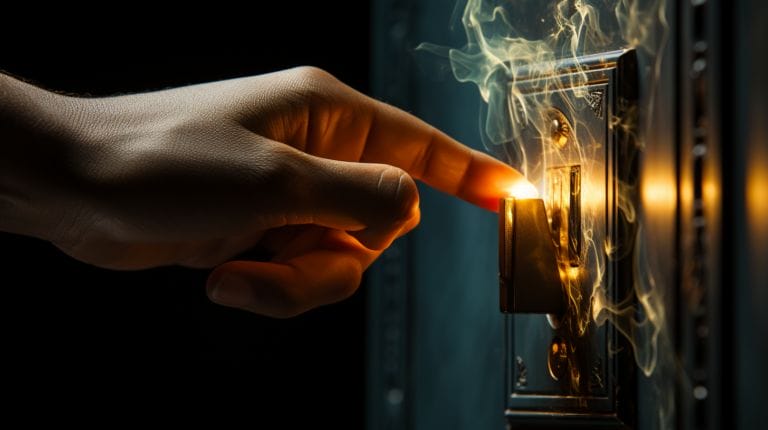How to Reset Solar Lights: Step-by-Step Guide for Homeowners
Have you ever noticed that sometimes your solar lights don’t work as efficiently as they should, even when they’ve been exposed to plenty of sunlight?
Well, the solution might be simpler than you think. By following a few straightforward steps, you can reset your solar lights and have them shining brightly again in no time.
Stay tuned to discover cost-effective secrets to maximizing the performance of your solar lights through our easy-to-follow How to Reset Solar Lights guide that any homeowner can manage.
Key Takeaways
- Clean solar panels regularly for optimal sunlight absorption.
- Replace batteries if corroded or inefficient for enhanced charging. This is a cost-effective and simple fix to ensure your solar lights use power efficiently.
- Position lights strategically in sunlight-exposed areas for efficient performance.
- Adjust light sensor sensitivity and check LED bulbs for optimal functionality.
Troubleshooting Common Solar Light Problems

When solar lights malfunction, it’s crucial to promptly troubleshoot common issues to ensure optimal performance. One common problem that homeowners encounter is their solar lights not working despite being exposed to sunlight. This issue often stems from a lack of proper sunlight absorption, which is essential for the solar lamp to function efficiently.
To repair solar lights that aren’t working, the first step is to check the location of the lights. Ensure that they’re placed in an area where they can absorb an adequate amount of sunlight during the day. Obstructions such as trees or buildings can hinder the lights from charging effectively. By repositioning the solar lamps to a spot with better sunlight exposure, you can often resolve this issue.
Another factor to consider when troubleshooting solar lights is the condition of the solar panels. Over time, dust, dirt, or debris can accumulate on the panels, preventing them from absorbing sunlight properly. Regularly cleaning the solar panels with a soft cloth and mild detergent can help improve their efficiency and ensure that the lights receive enough energy to operate optimally.
Steps to Reset Your Solar Lights for Optimal Performance

To optimize the performance of your solar lights, consider resetting them following these steps. When your solar lights aren’t functioning as expected, a reset can often fix the issue and ensure they continue harnessing solar energy efficiently.
- Switch off the solar lights and remove them from direct sunlight to prevent the charging process during the reset.
- Disassemble the solar lights carefully, ensuring not to damage any components.
- Check the batteries for any signs of corrosion or leakage, as this can hinder the electricity storage capacity. If needed, replace the batteries with new ones to enhance the charging process.
- Inspect the solar panel for any dirt or debris that may be blocking sunlight from reaching the panel.
- Cleaning the panel can significantly improve the amount of solar energy absorbed, thus boosting the overall performance of your solar lights. Additionally, check the LED bulbs for any signs of damage or wear and tear.
- Replace faulty bulbs to restore the brightness and longevity of your solar lights.
- Once all components have been checked and any necessary replacements made, reassemble the solar lights and place them back in a sunny location to charge.
By following these steps to reset your solar lights, you can ensure they operate at their optimal performance levels.
Importance and Techniques of Cleaning Your Solar Panel

Cleaning your solar panel is essential for maximizing the performance and longevity of your solar lights. Regular maintenance ensures that your solar panel operates at its peak efficiency, allowing it to harness more sunlight and convert it into electricity effectively.
Here are five innovative techniques to keep your solar panel clean and performing optimally:
- Use a Gentle Cleanser: Avoid harsh chemicals that could damage the solar panel. Instead, opt for a mild soap solution or specialized solar panel cleaner.
- Soft Brush or Cloth: When cleaning the panel, use a soft brush or cloth to gently remove dirt, dust, and debris. Avoid abrasive materials that could scratch the surface.
- Regular Cleaning Schedule: Establish a routine cleaning schedule to prevent the buildup of grime on the panel. Regular maintenance can significantly impact the performance of your solar lights.
- Inspect for Damage: While cleaning, inspect the solar panel for any signs of damage or wear. Addressing issues promptly can prevent further complications and ensure the longevity of your solar lights.
- Consider Weather Conditions: Be mindful of the weather conditions when cleaning your solar panel. Choose a time when the panel isn’t too hot to prevent cleaning solutions from evaporating quickly.
Replacing and Caring for Your Solar Light Battery

Maintaining the battery in your solar light is crucial for ensuring consistent performance and longevity. When your solar lights start dimming or not working at night as they should, it’s a sign that the battery needs attention. To safely replace your solar light battery, start by turning off the light and allowing it to cool down. Open the compartment where the battery is located, remove the old battery, and replace it with a new one of the same type and voltage to maintain optimal performance.
To extend the life of your solar light battery, make sure to recharge it fully before turning on the light for the first time. This initial charge sets the tone for the battery’s performance. Additionally, regularly clean the solar panel to ensure maximum sunlight absorption, which in turn helps keep the battery charged efficiently. When not in use for extended periods, store the solar lights in a dry and cool place to prevent damage to the battery.
How Can I Reset My Solar Lights to Enhance My Outdoor Space?
To enhance your outdoor space, try these landscaping solar lights ideas. To reset your solar lights, follow these steps: turn off the lights, remove the batteries, leave them off for 48 hours, then turn them on. This should help improve their performance and enhance your outdoor ambiance.
Proper Positioning and Sensor Adjustment for Solar Lights

Positioning our solar lights in areas that receive ample sunlight throughout the day is essential for optimal performance and efficiency. To ensure your solar lights work efficiently, consider the following:
- Avoid Shade: Placing solar lights in shaded areas significantly reduces their ability to charge properly. Aim for locations with direct sunlight exposure.
- Light Sensor Adjustment: Check the sensitivity of the light sensor to ensure it can distinguish between day and night accurately. Adjust if needed for optimal performance.
- Optimal Positioning: Position your solar lights facing south to maximize sunlight exposure during the day, allowing them to absorb as much energy as possible.
- Elevation Matters: Mounting solar lights at an elevated position can enhance their sunlight absorption capacity, leading to better performance.
- Regular Maintenance: Keep solar panels clean and free from debris to prevent any obstruction that may hinder sunlight absorption.
Properly positioning your solar lights and adjusting the light sensor can significantly impact their overall performance. By strategically placing them in sunlit areas, ensuring the sensors are calibrated correctly, and performing regular maintenance, you can maximize the efficiency and longevity of your solar lights.
Conclusion
In conclusion, resetting your solar lights is a simple process that can help improve their performance and longevity. By troubleshooting common problems, cleaning the solar panel, replacing the battery, and adjusting the positioning and sensors, you can ensure that your solar lights continue to illuminate your outdoor space effectively.
Taking care of your solar lights won’t only save you money in the long run, but also contribute to a more sustainable and eco-friendly environment.
Frequently Asked Questions
Why do my solar lights stop working?
Solar lights may stop working due to a variety of reasons, such as insufficient sunlight, faulty wiring, dirty solar panels, or worn-out batteries.
How do I fix solar lights that have stopped shining?
To fix solar lights that have stopped shining, start by ensuring they receive direct sunlight, checking the wiring for any electrical issues, cleaning the solar panels, and replacing the batteries if needed.
How can I reset the light sensor on my solar lights?
To reset the light sensor on your solar lights, turn them off for a couple of seconds to a minute, then turn them back on. This should recalibrate the sensor, providing a simple fix to ensure it’s working properly.
What should I do if my solar lights stop functioning at night?
If your solar lights stop functioning at night, make sure they are placed in an area where they receive adequate sunlight during the day to charge the batteries properly.
How often do I need to replace the batteries in my solar lights?
On average, the batteries in solar lights may need to be replaced every one to two years, depending on usage and manufacturer recommendations.







